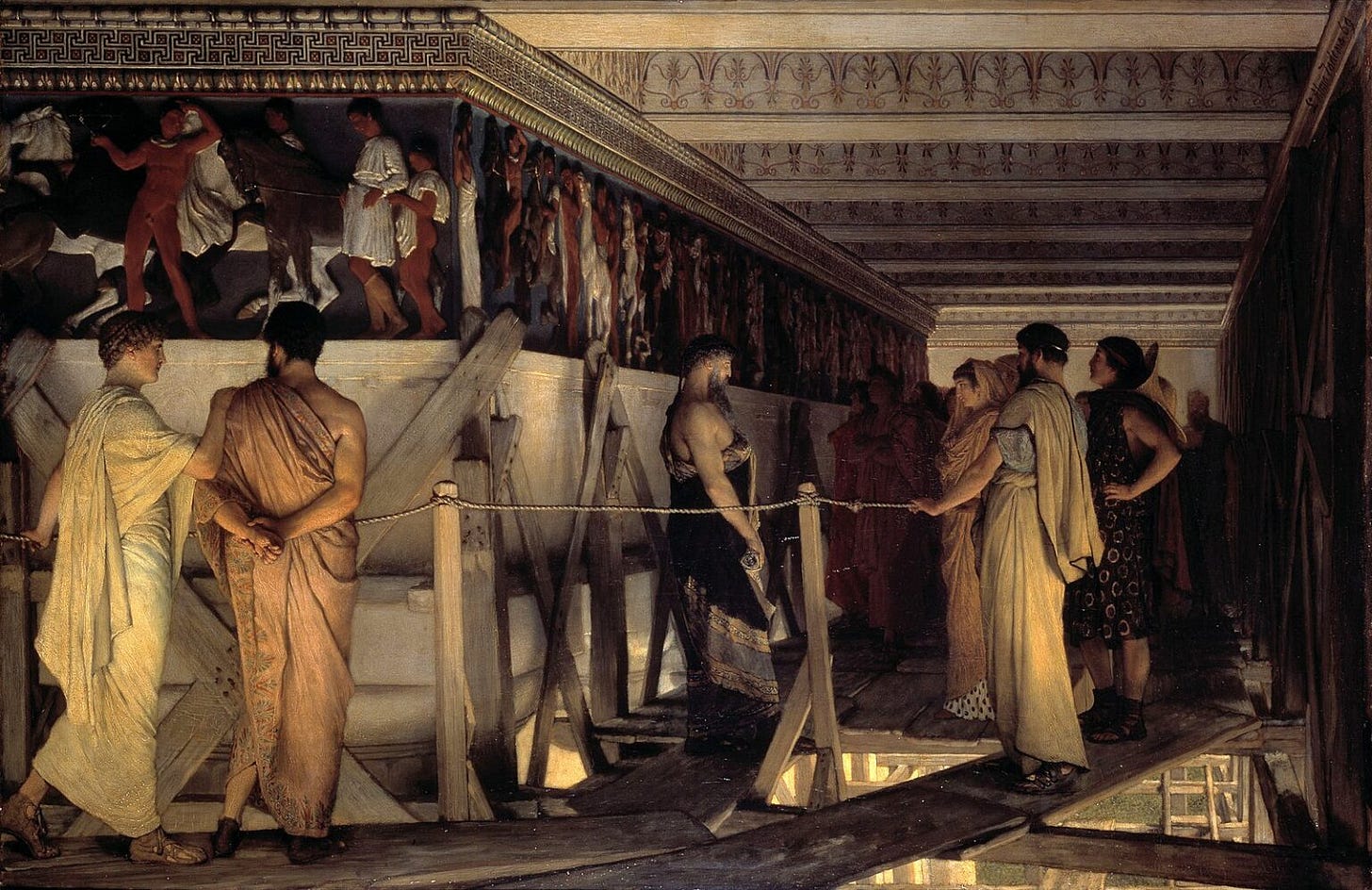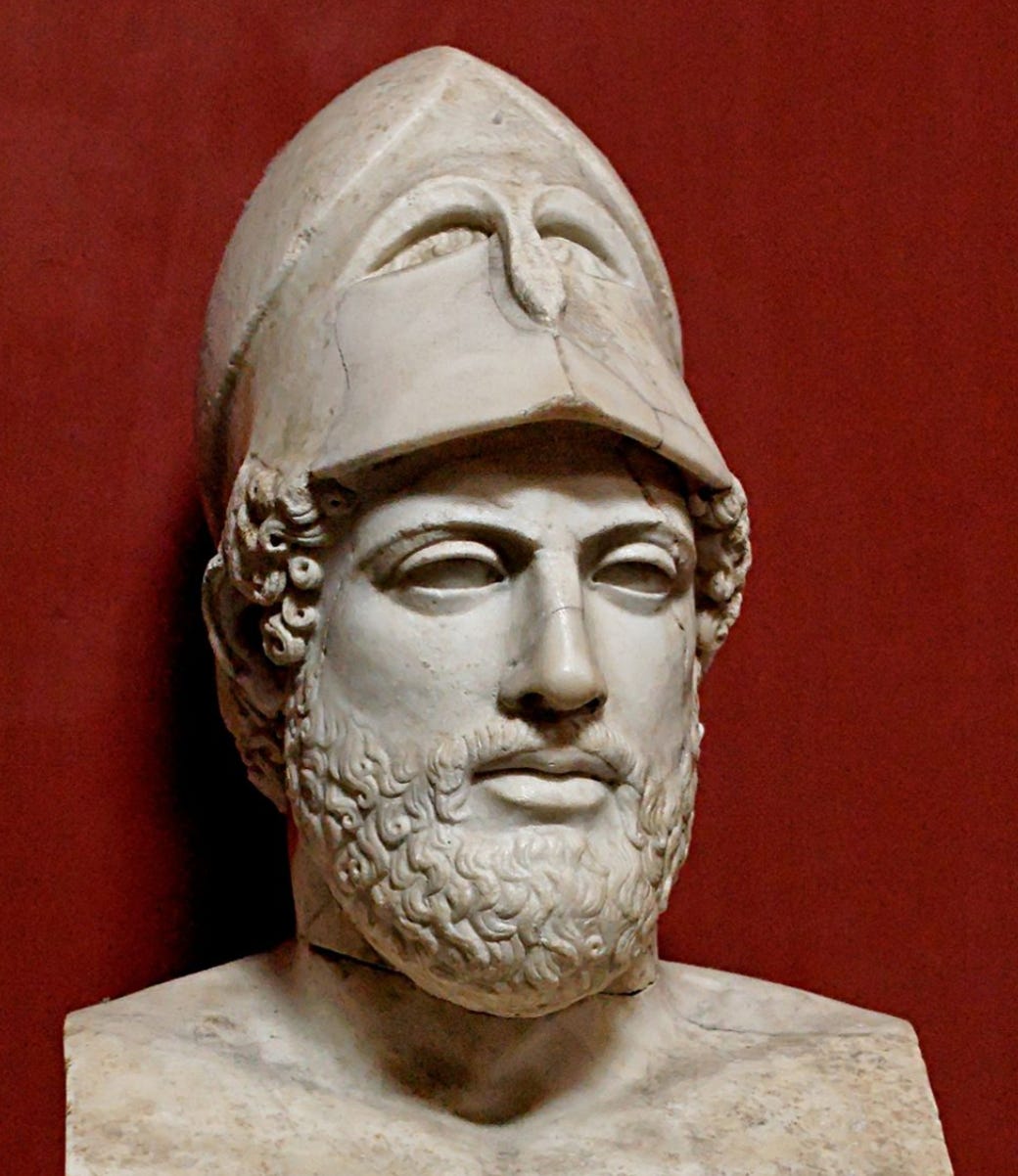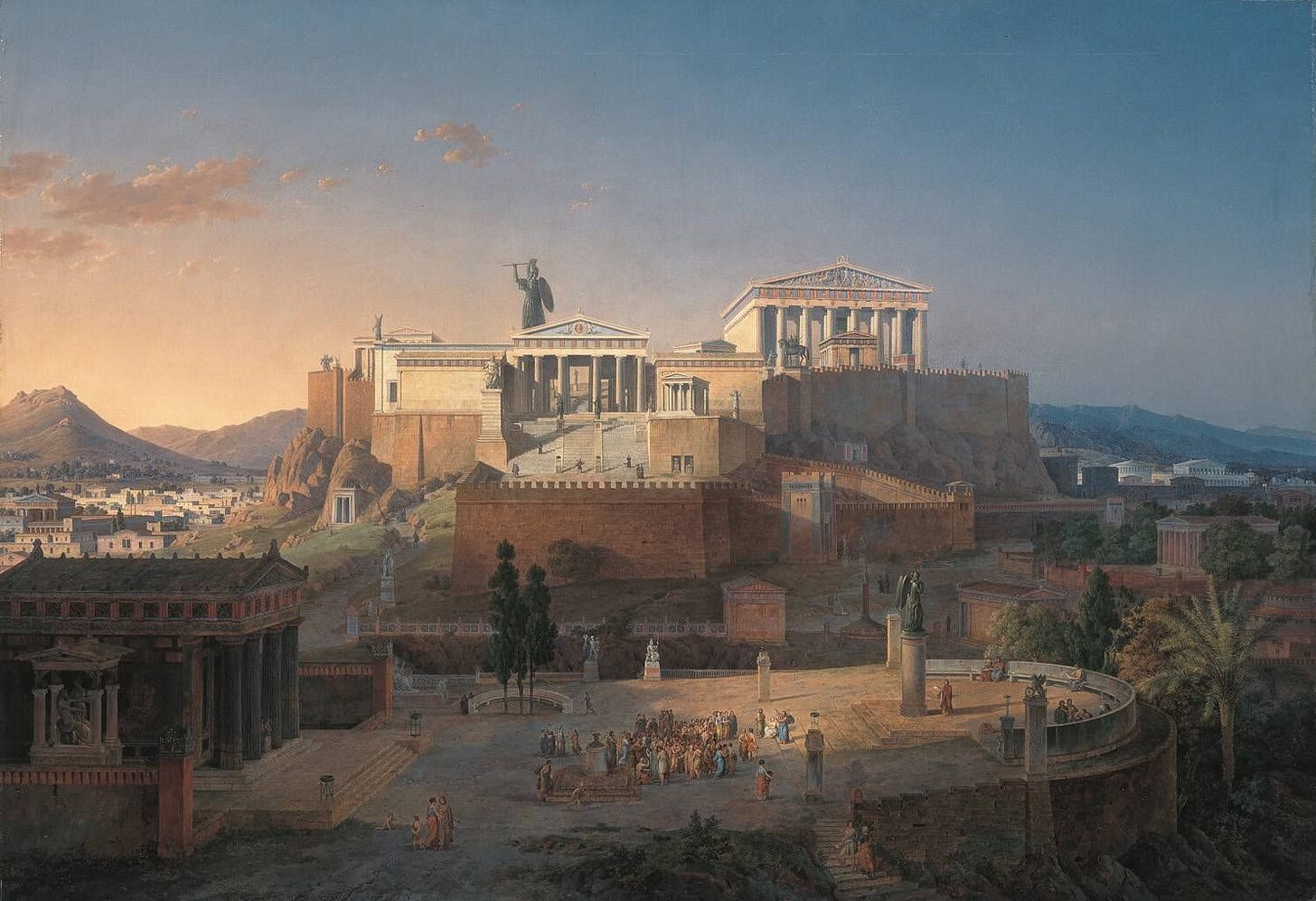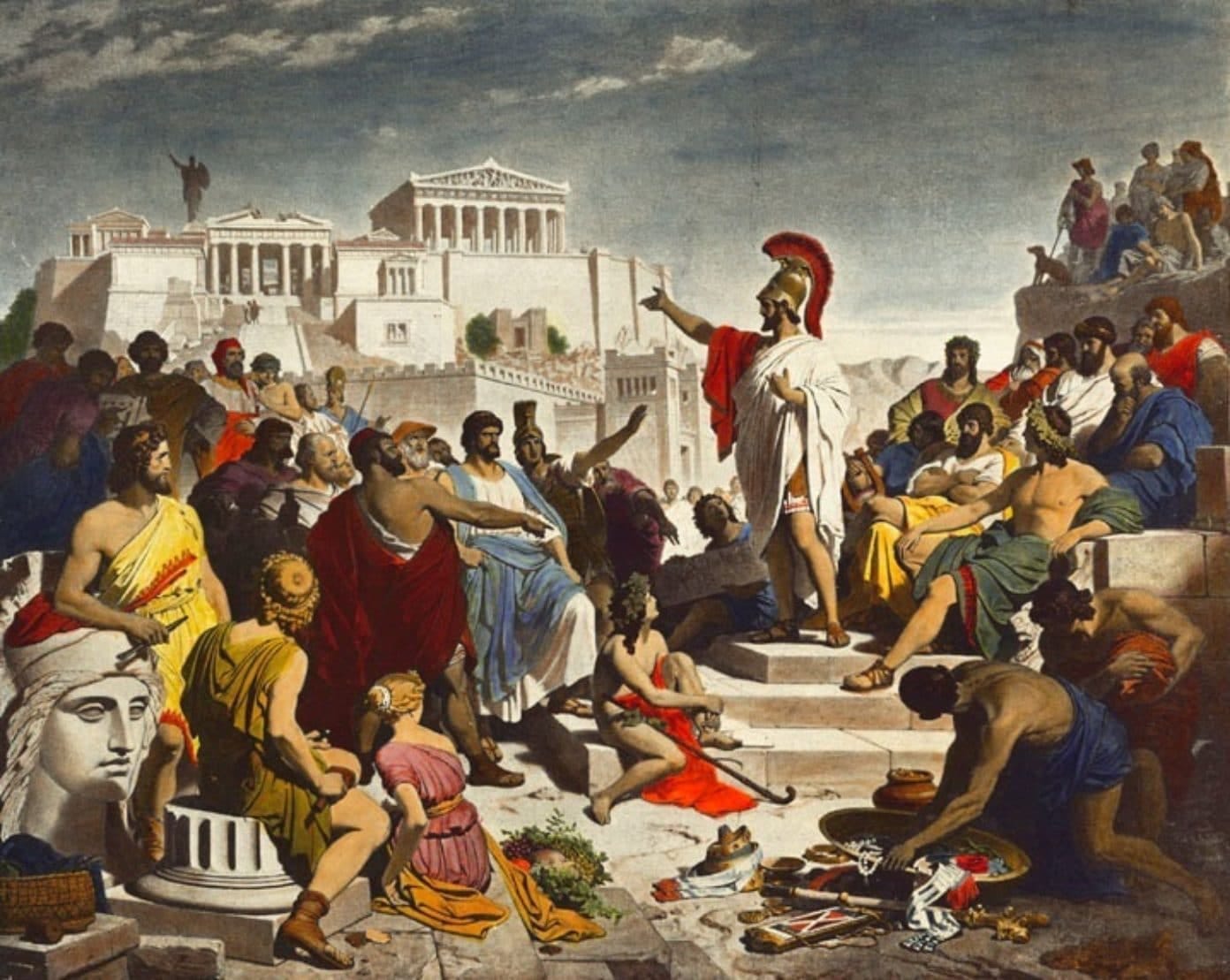What Does It Feel Like to Live in a Golden Age?
Can we ever know if we are in one?
If we were in a golden age right now, or at any point in the future, how would we know?
This question obviously depends on what “golden age” means. Originally, the phrase is from Greek mythology. In Works and Days, the poet Hesiod periodized the past into the Golden Age, the Silver Age, the Bronze Age, the Heroic Age, and the (current) Iron Age. Most of these ages were considered worse than the previous ones; hence the Golden Age was the most ideal. It was a time of plenty, with no need for agriculture. Arts and literature hadn’t been invented yet. People lived simple, pastoral lives.
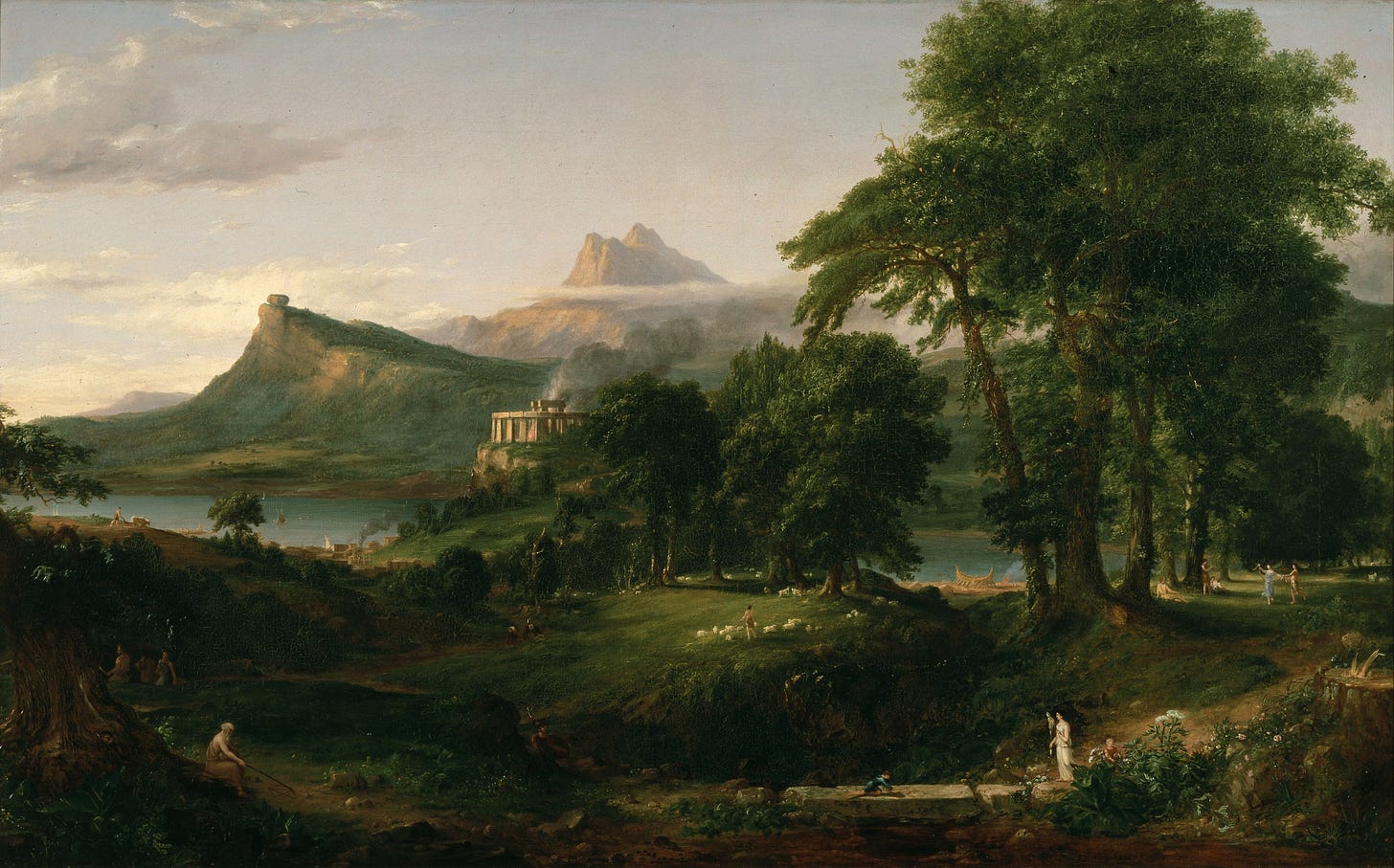
Over time, however, “golden age” came to mean a different thing. As a metaphor, it describes a historical period that is rife with cultural achievements. Unlike the mythological version, the golden age of a society implies an unusual abundance of art and literature — as well as architecture, scientific and technological advancement, and peace and social harmony. The term can also be applied to a genre or field of human activity, as in “the golden age of American comics.”
Historical golden ages are usually defined by contrast with adjacent periods. We look at the past, and note that in a specific time and place, there was more production and innovation than before and after.
To take a classical example, the fifth century BC in Greece, especially in the city-state of Athens, was a period of great flourishing. In the previous decades, Greece had almost been conquered by the Persian Empire, which launched large invasions that were only repelled after Athens had been burned to the ground. Afterwards, a destructive war with Sparta would leave Athens conquered and all of Greece weakened, paving the way for the domination of Macedon and later Rome. In between there was a golden age.
The Golden Age of Athens is particularly important to the modern Western world because many parts of our civilizational foundation were developed then: democracy, Herodotus's histories, Hippocrates's medical advances, Socrates and the foundation of philosophy, the Greek playwrights and the birth of tragedy and comedy. But this is something we know now. Would the people of Athens in, say, 440 BC, know that they lived in an especially good and interesting period of Greek history? Would Athens’s neighbors have realized it?
Must golden ages always be defined retroactively, or can they be perceived from within?
To answer this question, let’s study the state of Athenian society during its golden age. Maybe we’ll discover some hints that people would have been able to pick up on. From there, maybe we can determine whether our current time can qualify as a golden age, and whether we can direct our ambitions so that our near future becomes a long-lasting golden age as well.
Athens in the 400s BC
We’ll examine Athenian society during its Golden Age along three axes: politics, culture, and economy.
I. Politics and Military
After the Persian Wars, Athens grew to become the most powerful city in Greece, rivaled only by Sparta. It led a coalition of between 150 and 330 city-states called the Delian League, which was meant to ward off any future invasions by Persia.
Athens was by far the dominant power in the alliance, so much so that the League is often called the Athenian Empire. The League’s money was kept on the island of Delos, hence the name, but it was moved to Athens in 454, where it was used to fund the building of the Acropolis and pay for many public offices. Hence, imperialism:
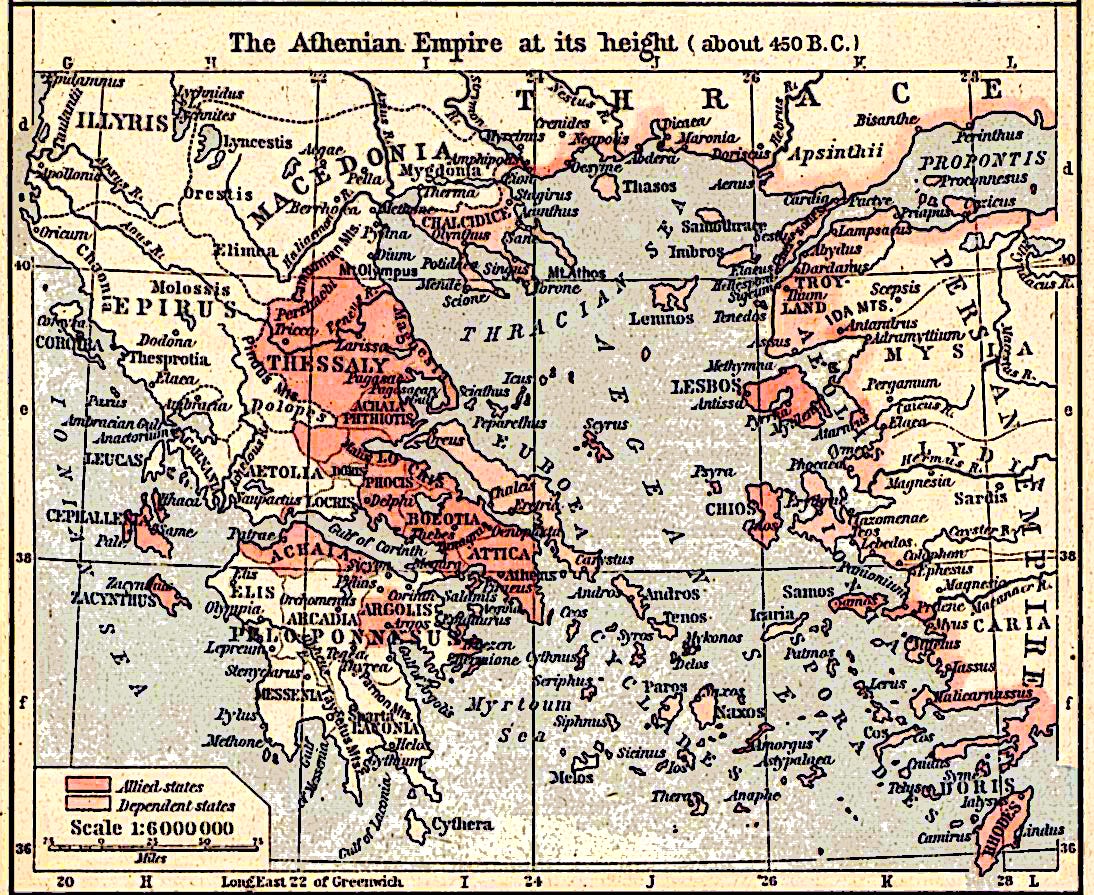
In domestic politics, ancient Athens is perhaps most famous for its democracy. There were a number of democratic Athenian institutions in the 5th century, coming together as a fairly complex system (see this chart derived from Aristotle, who wrote in the following century). The system included administrators chosen by lottery, as well as officials who were elected by the assembly of all citizens — male, native, and free adults. One of the most notable offices was that of the strategoi, or generals.
And the most notable strategos, at least measured from his fame today, was Pericles. Pericles was continually (and exceptionally) elected to the job for years. But his influence went far beyond being one of several military officers — he is considered to have effectively ruled the city for more than three decades through informal influence, from 461 to 429 BC. That period is known as the Age of Pericles, a phrase often considered to be a synonym for the Athenian Golden Age.
He was an outstanding orator, a patron of the arts (see next section), a competent military strategist, and a committed democrat. One of the key elements in his rise to power was the ostracism of Cimon, his main political rival, whom he accused of having helped Sparta. Pericles also expanded the extent of democracy in Athens, giving more power to the people. This made him a popular figure; according to his detractors, it made him a populist.
We can never have truly unbiased views of ancient historical characters. The main contemporary source about Pericles’s life, Thucydides, was a big fan of his; but many others were critical. Of course, contradictory opinions about a politician are a healthy feature of democracy. Whatever the conclusion is, it’s clear that Pericles was hugely important in shaping the Golden Age of Athens.
To answer our question about awareness of the golden age, here is a summary of what seems relevant, politically, to Athens’s prosperity in the fifth century:
a strong, popular, and long-lasting leader
robust democratic institutions
recent military successes
political and economic domination over other cities.
This last point deserves a note: It seems obvious that being more powerful than your neighbors, and ruling some of them outright, means that you’re doing well. This isn’t good news, however, if political dominance is in itself the cause of a golden age. Exploitation and extraction are zero-sum games: there can be only a small number of winners. On the other hand, the arrow of causation may have gone the other way. The geopolitical advantage of Athens may have been a result of its cultural and economic flourishing.
Alternatively, we can see the accomplishments of Athens as a golden age for Greek civilization in general, the Western world, or even all of humanity — especially when we consider its cultural production. In this view, yes, Athens dominated some of its neighbors, but it was to their benefit.
II. Culture: Architecture, Art, and Philosophy
Culturally, classical Athens achieved so much that it’s difficult to know where to begin. Perhaps the most obvious symbol of Athenian cultural achievement is the Parthenon — a temple to Athena built on the Acropolis that has overlooked the city ever since.
The Parthenon, so-named because of Athena’s epithet parthenos, meaning “virgin”, was built using the Delian League’s money under the direction of Pericles between 447 and 438. Most of the Acropolis, including several other temples and monuments, was built during that time, to some controversy: the money can be considered to have been embezzled. Other architectural feats of the golden age include the Long Walls, which fortified the road between Athens and its port of Piraeus.
One of the most notable features of the Parthenon is the frieze, the sculptures that decorated the top of the temple (most of which are now in the British Museum). Those are most likely the work of sculptor Phidias, considered one of the greatest sculptors in Greek history. Phidias also made the statue of Athena in the Parthenon, and the Statue of Zeus in Olympia, of “Seven Wonders of the World” fame.
Phidias was by no means alone. Another important Athenian sculptor of the era is Myron, known for the famous Discobolus statue. In the broader realm of the visual arts, ornate Greek pottery was produced abundantly during the period.
The Athenian Golden Age was also the golden age of Greek theater. If you know the names of any ancient playwrights, it is probably those of tragedians Aeschylus, Sophocles, and Euripides, or comedian Aristophanes, all from classical Athens. Theater played a big role in the city’s civic life. They formed part of the many public festivals, like the Panathenaia and the Dionysia. Many innovations in drama date from the period, such as the idea of having characters interact between them.
Beyond the arts, Athens was also a major intellectual center. The city was home to major historians Thucydides, Herodotus, and Xenophon. The “father of medicine” Hippocrates — you probably know him from the Hippocratic Oath — also lived during the fifth century in various locations throughout Greece, including Athens.
And then there is philosophy. Socrates, considered so important that all previous philosophy is called “pre-Socratic,” was active in Athens until his death at the very end of the fifth century. His student Plato, and Plato’s student Aristotle, though they were active after the Age of Pericles, are also responsible for much of the massive intellectual output of the city. In addition, Socrates and his successors weren’t the only philosophers in town: others include Anaxagoras, Democritus (the grandfather of atomic theory), Empedocles, and more.
One interesting detail that sometimes goes unnoticed is that some of the intellectual life in Athens took place at the salon of Aspasia — a foreign woman who was also Pericles’s long-term companion. Socrates, among other writers and thinkers, frequented her home. We don’t have a lot of biographical data about Aspasia, who may also have been something less savory such as a brothel keeper. But I like this detail because it’s too easy to consider cultural achievements in the abstract; yet Socrates and others were living human lives, and it matters what the environment in which they were able to work was. If Aspasia and Pericles were able to create a scene, a group of smart and interesting people who encourage each other to produce great work, then that’s really important.
One important property of all of the above achievements is that they have had long-term impact. Classical Greek statues have been copied by the Romans and many others since. The Parthenon still stands as a symbol of modern Athens. Socrates and Plato are widely taught in philosophy classes. Ancient tragedies and comedies are still shown in theaters. Western civilization itself is often considered to have been born in Ancient Greece. The fifth century BC Athenians could not know this would be the case, of course. They could, at most, guess.
To summarize this section, we have, as cultural characteristic of the Athenian Golden Age:
the activity of world-class artists and thinkers
abundant public funding for the arts
integration of art in public life, through monumental buildings and theater
artistic innovations
an active, well-connected intellectual scene
long-lasting cultural influence.
III. Economy and Daily Life
It seems possible, at least in theory, that a country produces world-class art and philosophy thanks to a tiny elite, while 99% of the population toils away, barely above subsistence level. For us, thousands of years later, the cultural results may sound impressive; but for almost everyone living at the time, it would be absurd to call the period a golden age.
So how wealthy was Athens in the fifth century BC, and how was the wealth distributed?
According to “Wealthy Hellas,” a 2010 paper by Josiah Ober examining these questions, classical Greece in general and Athens in particular were quite wealthy by the standards of pre-modern societies. There was significant growth during the golden age and the previous centuries, and the population was denser and more urbanized than comparable societies.
Moreover, Athens was relatively egalitarian (among citizens, at least, which to be fair does exclude a large part of the population — slaves and immigrants). Instead of a large population at subsistence level supporting a small elite, there was a large middle class, as evidenced by data on house sizes, landholding, and daily wages. The upper class did not accumulate enormous wealth. The Gini coefficient, which estimates the wealth distribution in a group (lower means more egalitarian), was calculated to be 0.708 for citizens in the late fourth century. How does this compare to other societies?
The late-classical Athenian citizen-family level of total-wealth inequality is roughly comparable to that of the total population of the USA in 1953-54 (0.71). It is less equal than Canada in 1998 (0.69), but more equal than Florence in 1427 (0.788) or the USA in 1998 (0.794). It is much more equal than the USA or England in the early 20th century (0.93 and 0.95 respectively).
These numbers are, of course, educated guesses. But they do point to a civilization that prospered more, and for more people, than most other societies before the modern era. In fact, Ober suggests that Greece in the classical period was wealthier than the later Roman Empire and could even be compared to early modern European countries like England and Holland. As additional evidence, table 3.4 in Farewell to Alms by Gregory Clark shows that daily wages for unskilled laborers was higher in classical Athens than in almost any other pre-industrial society, even England on the cusp of its industrial revolution. This is in stark contrast with the commonly held view that ancient Greece was a poor society.
Athens also had an advanced welfare system for the time. War widows and orphans were taken care of by the state. The state sought to give work and land to poor citizens. At any given time, a large part of the population was involved in civic duties, such as jury service, which provided a low but significant wage.
Such programs were seen as essential for the functioning of democracy. And although social classes did not disappear (and women, foreigners and slaves were still considered inferiors), it seems like this enabled social mobility. Aristophanes and Socrates are two examples of poor people who grew to be successful.
Did the Athenians know they were living in a golden age? At a minimum, they must have known that they were living pretty good lives even if they weren’t kings or princesses. A male citizen, even a poor one, could be confident that he would have opportunities to influence local politics, receive a good education, participate in festivals, and have his dependents supported by the state if he died. I suspect that such trust explains a big part of Athens’s successes in culture and politics.
Thus, economically, we add to our list:
economic growth
density and urbanization
a relatively egalitarian distribution of wealth
the absence (or small size) of an ultra-rich elite
a functioning welfare system.
Again, one caveat is that some of the spending by the Athenian state may have been possible only by using the Delian League’s treasury, which was extracted from dominated cities. And let me emphasize once again the major caveat that women, slaves, and immigrants — a substantial majority of the total population of Attica — are by default excluded from the entire argument. This isn’t sufficient to defeat the point, since other ancient societies were hardly more egalitarian in that respect, but it does make it tricky to compare the Athenian Golden Age to our own time.
Did the Athenians Know?
The Athenian Golden Age was brought to an end by the Peloponnesian War, in which Sparta conquered the city and installed an oligarchy to rule it. Athens would regain its democracy and some of its glory soon enough, and it would remain influential, for instance through Plato’s Academy. But its heyday was over.
It’s easy to imagine the people of Athens in the fourth century or later thinking back to the previous period and remember it as glorious. But let’s go back to our question: would the people of the golden age know they were in one? Obviously they couldn’t know that the entirety of Western civilization would consider their period to be particularly important for centuries and millennia. But maybe they could feel the greatness somehow?
Let’s ask the great man himself. At the start of the Peloponnesian War, Pericles gave a speech in honor of the soldiers who returned dead from battle. This speech is called Pericles’s Funeral Oration, and is known through the work of historian Thucydides. In it, Pericles extols his city’s qualities. For example, its government:
Our form of government does not enter into rivalry with the institutions of others. Our government does not copy our neighbors', but is an example to them.
Its luxuries and success in trade:
And we have not forgotten to provide for our weary spirits many relaxations from toil; we have regular games and sacrifices throughout the year; our homes are beautiful and elegant; and the delight which we daily feel in all these things helps to banish sorrow. Because of the greatness of our city the fruits of the whole earth flow in upon us; so that we enjoy the goods of other countries as freely as our own.
Its military strength:
Then, again, our military training is in many respects superior to that of our adversaries. Our city is thrown open to the world, though and we never expel a foreigner and prevent him from seeing or learning anything of which the secret if revealed to an enemy might profit him. We rely not upon management or trickery, but upon our own hearts and hands.
Now if you’re an even slightly skeptical person, you might want to dismiss this as obvious propaganda. Of course a politician will tell everyone in his city how great they are. In fact politicians do that all the time, even when their country is most definitely not undergoing a golden age. Add to this the fact that we can’t be sure whether Pericles really did say those words, or authored them (Plato thought Aspasia wrote them) and whether Thucydides recorded them faithfully (as opposed to writing whatever he wanted to say).
Yet, considering all we’ve seen, I tend to trust it. Pericles, at least, saw how great Athens was. He knew. He surely exaggerated some things, but he knew.
There’s an optimistic quality to the oration. Maybe that’s the most important feature of a golden age — trust in the future, thanks to a prosperous present.
Was Pericles alone in this thinking? There are hints that he wasn’t. Aristotle compares the Greeks favorably to foreigners — ”barbarians” — in much of his work, which could be interpreted as chauvinism, but may also reflect an accurate belief that the Hellenes in general or the Athenians in particular were doing better as a civilization than others. When Sparta conquered Athens at the end of the Peloponnesian War, it didn’t destroy it and enslave its population, as Thebes and Corinth would have liked; instead they spared it, justifying this by saying Athens had done good for Greece in the earlier war against Persia, and incorporated it into their empire. It seems plausible to me that even if the two city-states differed so much, Sparta saw that Athens was a great city, worthy of being saved.
One may object that it makes little sense to project my own modern attitudes on the ancient Athenians. Perhaps they wholly bought into Hesiod’s notion that the world was getting worse since the original Golden Age. That seems unlikely to me. Surely they were able to distinguish between prosperous and difficult times, and prefer the former.
Lessons for Today and Tomorrow
I am writing this essay in September 2021. As of today, are we in a golden age?
The question hinges quite a lot on who “we” is. An individual country? The Western World? All of humanity? Interesting answers can be given for each, but we won’t get into the minutiae.
It also hinges on what comes next. Paradoxically, if the future is worse than the present, then our time might be remembered as a golden age, right before the fall. If however our future gets much better than the present, then maybe we’ll be seen as having lived through a dark age.
But we can’t know this — we can only compare with the past. With that in mind, how do we do?
There are many reasons to think we are in an especially prosperous period. There is less extreme poverty than ever before. A variety of human development indicators, like literacy and child mortality, have tremendously improved in the last decades. New technologies are appearing, improving our health and quality of life. More and more art is being produced — for instance, the numbers of produced films and published books have kept increasing — and new forms of art are being invented. It’s too soon to know whether our time has produced artists or intellectuals whose achievements will resonate for millennia, but it’s plausible that some will.
On the other hand, the political institutions of democratic countries seem weaker than ever before, while non-democratic countries like China are on the rise. Few world leaders in the West are effective and popular. Many lament the weakening of civic life, the loss of vibrant communities, and the perceived rise in loneliness. Economic inequality is increasing — which creates a feeling of unfairness even when it is the result of growth. Trust in the future is low, especially when it comes to the environment. Techno-pessimism is rampant. And in the West, at least, there is very little monumental architecture. Nothing like the Parthenon is being built anywhere.
(No, the Nashville Parthenon doesn’t count. It’s over 100 years old!)
Both cases seem about equally strong. When I asked my Twitter following whether they think we’re in a golden age, I got a relatively even split:
Several people pointed out that the question may be meaningless. They’re right, of course: a “golden age” is a fuzzy metaphor for a prosperous period; it could mean any number of things. Besides, the current world is too complex. Some countries or fields or artistic genres can be experiencing a golden age at any given time, which may or may not mean that the overarching group — a civilization, or the world — is.
Still, it’d be nice if we could draw some lessons from the Athenian Golden Age. Maybe we can identify what we’re doing right, and what we should be doing in the future.
It strikes me how the peculiar political system of Athens comes up all the time in this discussion. Ober hypothesizes that democracy helped build human capital (skills) and reduce transaction costs (by fostering trust), which contributed to economic prosperity. It also seems plausible that the egalitarianism of the city attracted artists and intellectuals. If the arrow of causation does point that way — rather than democracy being only a consequence of prosperity — then it behooves us to nurture and improve our own democratic institutions.
Art and intellectual work are the most likely candidates for achievements that will be remembered for a long time. Without Socrates, Phidias, and the Greek playwrights, we most likely wouldn’t be discussing the Athenian Golden Age at all. This suggests that pouring resources into culture is the mark of a prosperous civilization — we shouldn’t focus exclusively on what is immediately useful. One thing we could definitely do better is build architecture that is more grandiose than what we currently tend to do, whether this means going back to classical architecture or not.
The Athenian experience also suggests that we should desire both economic growth and wealth redistribution. These two forces often contradict each other; the exact balance between them is a matter of debate. But we do need the golden age to profit everyone. We should avoid going back to the small elite and large lower class model that most societies used to follow. We also can’t rely on zero-sum extraction: in our globalized world, we should want the golden age to apply to everybody.
To me, the main lesson from the Golden Age of Athens is the importance of self-confidence for a society. I imagine (accurately or not) the fifth-century Athenians to have believed that they were the best. That no one could beat them. That they had the best monuments and the best gods and the best political system.
Perhaps that’s what a golden age is, after all. A period of high trust in our own capabilities, and in the future. If we think we’re not good at creating great work, then we won’t create great work. So perhaps we should start believing we — present-day people — are the best humanity has done so far. Let’s believe we’re good. Let’s believe that we’re headed to a bright future. And then let’s build our own Parthenon to inspire people for the millennia to come.


